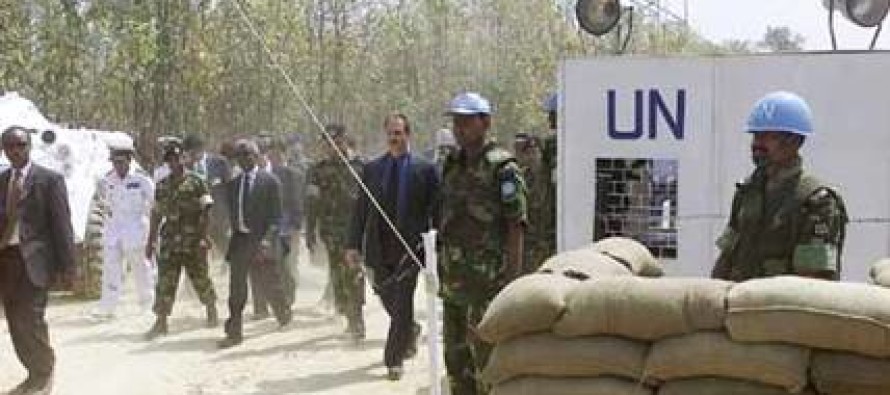Bangladesh’s role in Peacekeeping Mission across the World

Bangladesh observes every year on 29th May as “International Day for UN Peacekeepers” like other member-countries of the world.
The purpose of observing the Day is :
• to honour the UN peacekeepers who lost their lives for peace,
• to underscore the importance to maintain global peace and
• to pay tribute to those who were/are involved in the peacekeeping missions..
Bangladesh was born out of armed conflict for nine months in 1971 with Pakistan army and became a sovereign nation on 16th December 1971. As a result Bangladesh’s commitment to peace—global and regional— is total.
Bangladesh’s participation in the UN peacekeeping missions has become an important component of foreign policy and the country has attained a good standing in the comity of nations.
One particular fact is to be noted in this context what Lord Palmerston has said that no country is an eternal enemy or a permanent friend. What is permanent is national interest and it is to be pursued vigorously and Bangladesh’s foreign policy seems to have taken into account of it.
Bangladesh’s strength lies in not taking extreme views on any global or regional issue. Bangladesh is capable of persuading like-minded countries to see a particular point of view on a given issue and may achieve success in multilateral foras.
Bangladesh is a responsible nation and plays its due role in all UN activities after its admission in September 1974. Currently Bangladesh is a member of executive or governing bodies of 22 UN agencies.
Bangladesh’s commitment to peace is demonstrated by its contribution to the UN peacekeeping missions. In 1988, Bangladesh first joined the UN peacekeeping mission whose participants are known as “Blue Helmets”, (after the blue colour of the UN flag) with only 15 military observers.
This year, Bangladesh has stepped into 23rd year of participation in UN peacekeeping mission across the world. Bangladesh uniformed personnel have set values, norms and professionalism wherever they went. Their role was admired by successive Secretaries General of the UN.
As of May 2011, about 100,000 uniformed personnel have participated in 46 peacekeeping missions in 32 countries which included Cambodia, Bosnia, Georgia, Mozambique, Namibia, Liberia, and Sierra Leone. Bangladeshi army General led the peacekeeping mission in Mozambique in 1994 and another army General in Georgia in 2002. One Bangladeshi General led the UN peacekeeping mission in Liberia.
Currently 10,621 Bangladeshi uniformed personnel are deployed in peacekeeping missions in 10 countries. This year, Bangladesh topped the list of countries in sending its personnel for peacekeeping missions.
Since the peacekeeping missions are often risky in tribal-torn conflicts in Africa, there have been casualties of Bangladeshi peacekeeping troops (nine soldiers) in the Democratic Republic of Congo on 25th February, 2005. As of May 2011, a total of 103 valiant Bangladeshi peacekeepers died for the cause of world peace and 116 wounded.
Bangladesh can hold its head high in the global arena because the Bangladeshi uniformed personnel have earned the gratitude of millions in lands, mostly in Africa, far distant from Bangladesh They have helped restore tranquility and peace in many war-torn parts of the globe and have ushered in an era of hope in countries which had only known despair and war.
During the UN General Assembly session in 2010, both the Secretary General Ban ki-moon and President Obama conveyed their appreciation of the role of Bangladesh peacekeeping forces to Prime Minister Sheikh Hasina while she was attending the session of the GA of the UN. Bangladesh became a member of a UN board for peacekeeping missions.
Peacekeeping mission is to be distinguished from peace-making and peace-building missions.
Peace-making is usually aimed at cessation of hostilities and restoration of peace while peacekeeping is to maintain peace, agreed between parties. That means once peace is restored, peacekeeping is to ensure that peace remains in the area.
Peace-building refers to efforts aimed at economic development, institution building, and more generally the creation or restoration within the countries of the conditions necessary to make them stable and peaceful after wars. It may involve rehabilitation of people and reconstruction of infrastructures. Peace-building after war is to help ensure there is no recurrence of war.
In future Bangladesh uniformed personnel may have to participate in the UN peace-making or peace-building missions of the UN. In this regard appropriate training together with learning and speaking in English language with ease and fluency may have to be provided by the Institute of Peace Support Operation Training for the armed forces at Rajendrapur.
By Barrister Harun ur Rashid
Former Bangladesh Ambassador to the UN, Geneva


